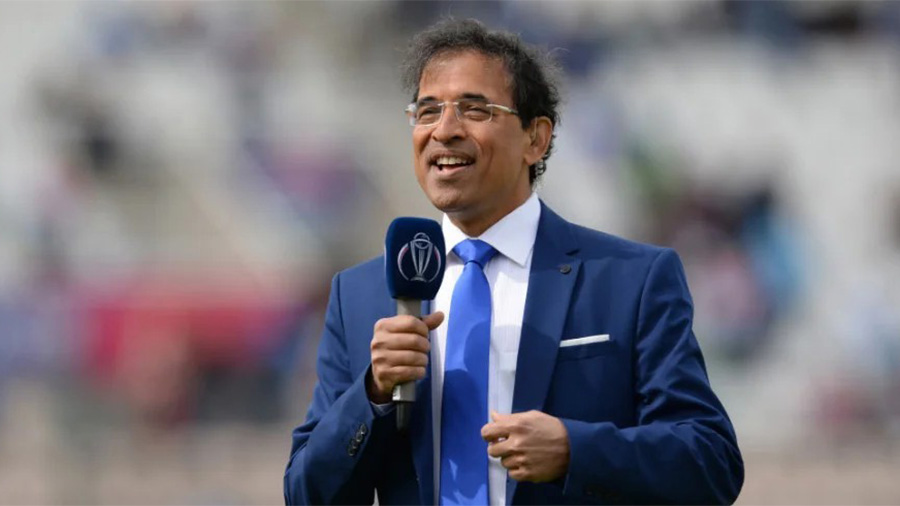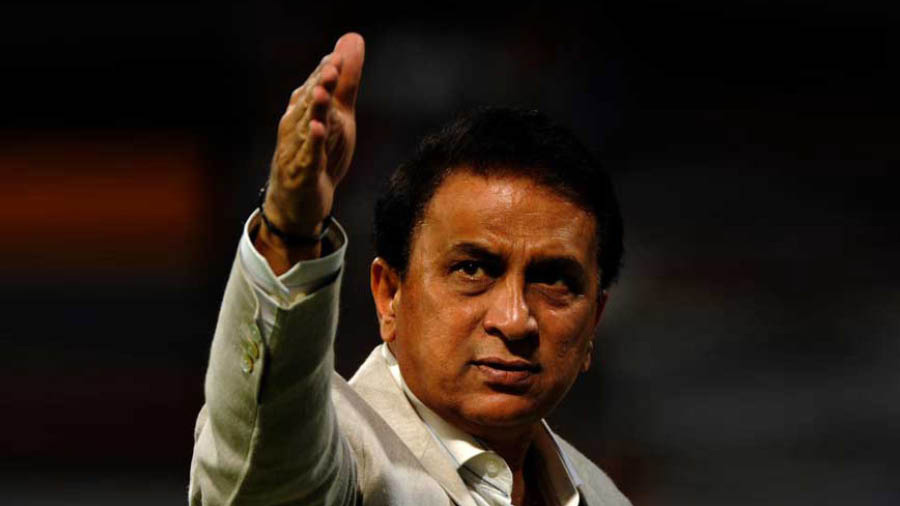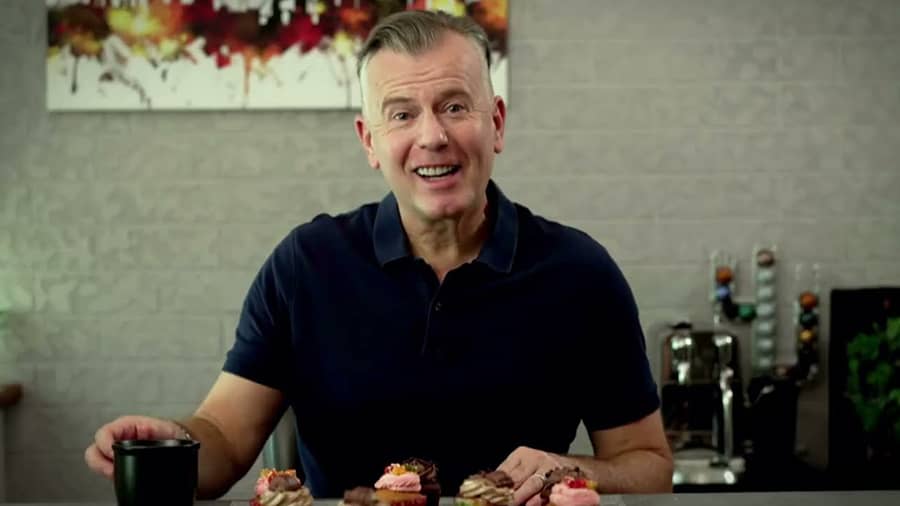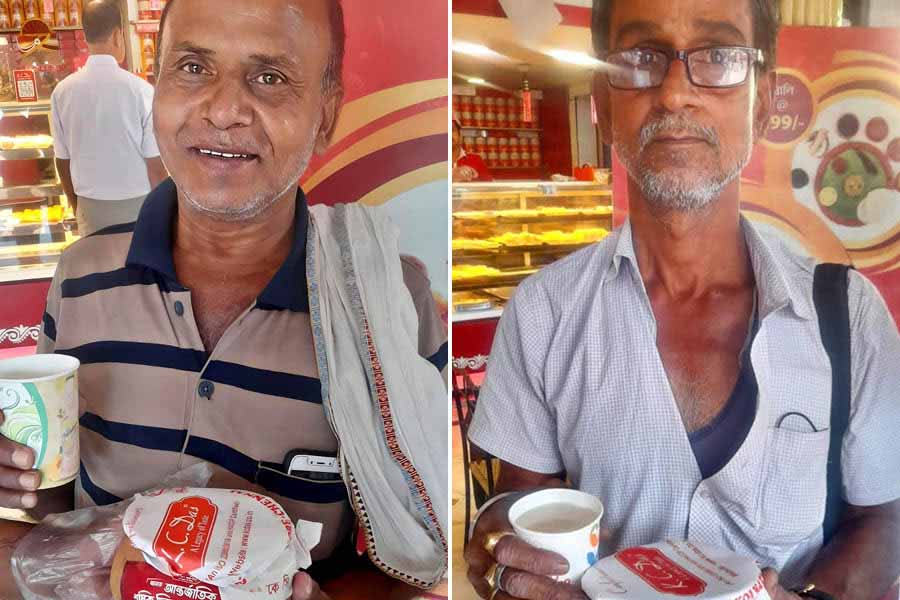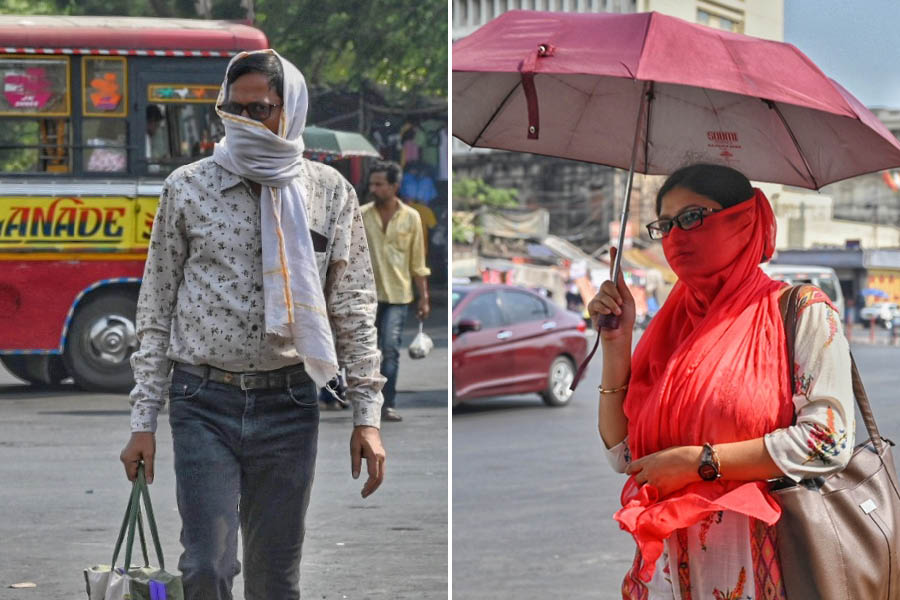If cricket is one of modern India’s most unifying stories, then Harsha Bhogle is arguably its most unifying storyteller. Not just because Bhogle, 62, has admirers spanning multiple generations and countries, but also because he has mastered the process of blending the three most important aspects of storytelling — substance, style and structure. Across a 40-year career, Bhogle has proven that it is possible to tell cricketing stories simply, with passion and poise, without making them simplistic. To retain nuance without losing perspective and to enlighten and entertain fans without patronising them.
Listen to Bhogle on air and you will notice how seamless everything feels. Even though he is speaking to millions at once, it seems like he is speaking only to you. There is an inherent intimacy in his cadence, a rare elegance in his modulation and a reassuring touch in his humour, one that cricket nuts and novices can relate to at once. Even though he seldom uses the same adjective twice in the same game, Bhogle’s words do not require a dictionary on standby. His rhetorical flourishes are not self-indulgent. There is no live poetry (though many of his phrases are poetic), no crass jokes and certainly no “tracer bullets”. Instead, there is an effective use of pauses and the spontaneity of silence, allowing images to take precedence whenever necessary, as when Virat Kohli produced one of his defining knocks to take India over the line against Pakistan at last year’s ICC Men’s T20 World Cup.
On calling Kohli’s heroics against Pakistan in Melbourne
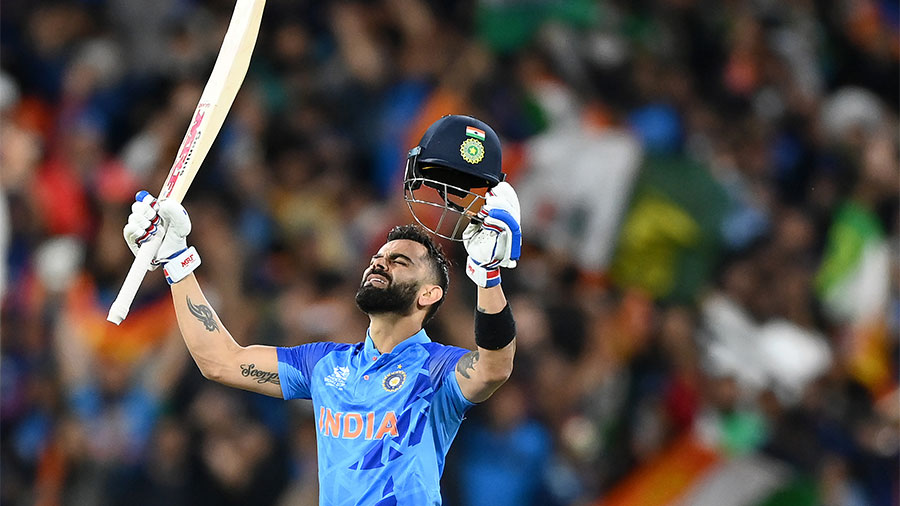
Virat Kohli after clinching a famous win for India versus Pakistan in Melbourne in October 2022
Getty Images“The game was so close and it was evolving all the time. My job was to stay in the moment,” recalls Bhogle, speaking exclusively to My Kolkata over the phone on the eve of the India-South Africa clash at the ongoing ICC Men’s Cricket World Cup at the Eden Gardens. “When an Indian social media hero is batting and the narrative is one person-centric, it’s very challenging. I had only one line in my head: What if India win? But I was acutely aware throughout that I was on a feed going to the whole world, not just India,” explains Bhogle. The line in his head never came on air, but the one that did and made him proud was delivered during the post-match ecstasy of a sensational India win. “Once the game was over, I said, ‘It is moments like these, Virat, that take you from beyond the present into legend.’ Because it wasn’t part of the action [during the match], people don’t remember it as much. But I was happy with it. After that, I didn’t check social media to see what people were saying. The next day, I got a congratulatory message from my producer. That meant a lot more to me because he was a part of my team.”
Having made his commentary debut for international matches (for Doordarshan) in Hyderabad in 1983, Bhogle has been a team player ever since, willing to acknowledge that a commentator or a presenter is one component of an ensemble, whose job is to support the show, not to steal it. Back in 2015, in another India-Pakistan encounter in Australia (this time in Adelaide), Bhogle was hosting the pre-game segment when the stadium gates were opened one hour before the match and “I couldn’t hear a word of what people two feet away from me were saying”. When faced with such a challenge, Bhogle’s responsibility was to “not let anybody who’s watching know that there’s a challenge”.
“On most occasions, the telecast, which is a feat of engineering in its own right, is such that the technical crew makes it easy for the presenter or commentator. Some days, it’s up to people like me to make it easy for them,” adds Bhogle. The Adelaide game is among Bhogle’s most memorable in his World Cup journey, as is another contest from the same tournament, when India played South Africa and “60,000 Indians sang the national anthem inside the MCG”.
Four years earlier, Bhogle, who had hosted the entire 2011 World Cup in India from a studio, had been apprehensive before the big final between India and Sri Lanka. “I kept telling myself that I must think of this as just another game. If I get worked up and think of doing well on a big day, I’ll definitely go wrong,” remembers Bhogle. It was this humility that helped Bhogle be a “student of the game” during the 2006 FIFA World Cup, for which Bhogle had worked 12-hour shifts for every single match over the course of a month. “I didn’t follow football much, so it felt like an exam. I was studying and presenting and I learnt a lot from my fellow broadcasters, particularly Gerry Armstrong (who will be familiar to La Liga viewers in India). Not once did he (Armstrong) say that he was a veteran and I was just doing my first few games. He was of huge help to me.”
‘I love working with and learning from commentators who are very well-prepared’
Last year, Bhogle’s connection with football deepend when he met Peter Drury, among the most well-known football commentators. “It was a lovely evening. We spoke about broadcasts and about being involved in a sport with people thinking you haven’t played it (Bhogle played several years of senior division cricket in Hyderabad). I don’t think Peter had a clue about how big he is among the football-watching population in India,” says Bhogle, who has often been compared to Drury by fans on Twitter (now X), but speaks of Irish football broadcaster Des Lynam as someone he looked up to in his formative years.
But what about cricket commentators? Who has Bhogle, who was voted by fans as their favourite commentator according to a Cricinfo poll in 2008, learnt the most from? Rather than mentioning names, Bhogle mentions attributes. “I love working with and learning from commentators who are very well-prepared. Who have opinions that force you to have opinions and be ready.” Speaking of preparations, what is Bhogle’s pre-match routine like, especially during a World Cup? “Commentary has become more data and analytics driven. There’s so much information nowadays that I have to decide how much I want to read. Most of the prep for a tournament happens before the tournament begins. Typically, before matchdays, my teams will send me videos and pre-match info to look at. That’s what I go through alongside watching a lot of cricket,” answers Bhogle, who has the Australia-England game in Ahmedabad on mute in his hotel room during our conversation.
After Bhogle exclaims “caught” followed by “game over” to mark the dismissal of Ben Stokes, the discussion shifts to how commentary may evolve in the time to come. “I had suggested many years ago that every match will end up having three feeds. The first as it is now, with a lot of technical analysis, which is stat-driven, even nerdy. The second as a sort of a watch-along, where friends chat about the game, a lot like what we do at Cricbuzz. And the third where there’s no commentary at all, just the sounds of the game. This means that if I’m being heard, it’s because people have a choice,” describes Bhogle, who admits that the first of those feeds is becoming increasingly partisan. “I don’t know if commentators are being nudged, but it’s becoming a trend, fuelled by social media. Some people believe that you’re expected to be a representative of your country. But I hope it doesn’t go further than that. For regional or Hindi channels, I can understand if it’s an India-centric commentary. But I hope the day doesn’t come when you disregard the opposition and only talk about your team,” says Bhogle.
‘Ian Bishop realised that I understood the emotion of the moment better than he did’
In November 2013, Bhogle was in charge of calling a moment that went out to the world but whose significance was deeply Indian. It was the moment when Sachin Tendulkar went on a farewell lap around Mumbai’s Wankhede Stadium, having just retired from international cricket after 24 years. For those 24 years and more, Bhogle had seen the meteoric rise of Tendulkar from close quarters, as he had for that entire generation, including Anil Kumble, Sourav Ganguly, Rahul Dravid and V.V.S. Laxman.
“We had loads of conversations and knew a lot about each other. But not once did any of them tell me that they didn’t like something I said on air. With the subsequent generation, it has happened a few times,” reveals Bhogle. Returning to the day of Tendulkar’s retirement, Bhogle says, “For the most part, I wasn’t saying much. I was letting the pictures do the talking.” Bhogle was on commentary with Ian Bishop at the time, and Bishop, sensing it was Bhogle’s moment, chose to stay quiet, uttering just a single line. “Ian realised that I understood the emotion of the moment better than he did. And then, three years later in 2016, when Carlos Brathwaite hits four sixes in a row [to win the West Indies the 2016 T20 World Cup against England at Eden], who’s on air? Ian Bishop… Good things happen to good people.”
Even though Bhogle was not on commentary for the most decisive phase of the 2016 World Cup final at Eden, he has seen and called his fair share of incredible action in Kolkata, from the 1993 Hero Cup, when “the third umpire was sitting in the commentary box!” to the unforgettable turnaround by India against Australia in the 2001 Test. “Eden has become a more comfortable ground since it was scaled down from 1,00,000 people to about 66,000. But it continues to be a special place. It’s like a saucer-shaped thing and when it’s packed and you peek out from behind the sight screen, you think, ‘Wow, this is some place.’ From a broadcasting standpoint, it needs a bit of a revamp, as it was made so many years ago. But it’s a cosy place. Plus, Kolkata has my favourite hotel in the country!” shares Bhogle.
‘This World Cup is lucky it’s in India’
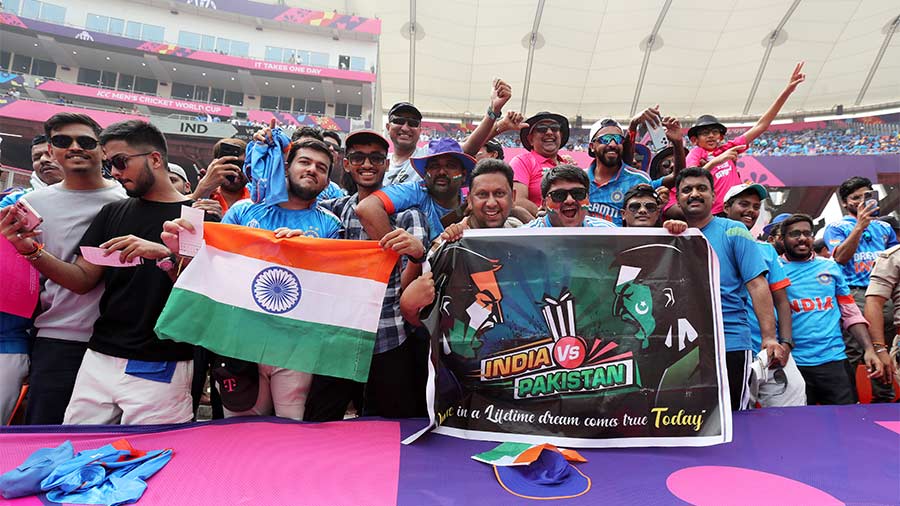
While the World Cup’s future is secure, that of bilateral ODI series is less so, believes Bhogle
Getty ImagesIn another universe, Bhogle would have called the 1987 World Cup final at Eden, between England and Australia. Having narrowly missed out on the ’87 experience, Bhogle’s World Cup initiation came on radio for India versus England at Perth during the 1992 World Cup. Thirty-one years later, there is still one moment he longs to call. “An Indian World Cup win. Ian Smith was fantastic in 2019 (when England beat New Zealand in the final). Ravi called that 2011 moment well. So, yes, I’d like to do it, too. But I won’t kill myself over it if it doesn’t happen,” says Bhogle, whose wish could well be fulfilled this year, given India’s rampaging form at the World Cup.
But, like some commentators and fans, does Bhogle feel India have peaked too early? Bhogle takes a few seconds before supplying an analogy. “If you’re going to write 14 articles on the World Cup and you want the 14th to be your best, do you want to write a bad article as number eight? It helps if number eight is a tricky article to do, but you don’t want to write a bad article. Similarly, if you’re playing well, you’re playing well. Yes, having a tough game in between is important. We were tested against Australia, we had a good run chase against New Zealand. But why should we worry? Sometimes, as a country, we can’t accept that we’re doing so well. Maybe it’s because the last 10 years have gone wrong, with India losing in the knockouts. Which is why everyone’s a little edgy. But it doesn’t help you enjoy the World Cup anymore.”
As for the World Cup overall, does Bhogle think that this edition is a litmus test for the future of 50-over cricket? “This World Cup is lucky it’s in India. Hosting an event where the home team has a chance [of winning] turns it into a celebration of the game. At the same time, few people are watching entire games. What has helped, though, is that this World Cup has made the matches feel more like short Test matches rather than long T20s. With so many different kinds of surfaces, the essence of bat versus ball has been retained. I’m a firm believer that if someone makes 380 on a pitch [in 50 overs] and it’s chased down, then it’s a sub-par pitch and needs to be reported. Just like you would do for an extremely low-scoring pitch. To go back to the question of 50-over cricket, I think the context of the World Cup and the fact that it’s still seen as the pinnacle of achievement will ensure it lasts. But I can’t say the same for bilateral ODI series, which may struggle to survive.”
‘I don’t like screaming, ranting, shouting or provocative television’
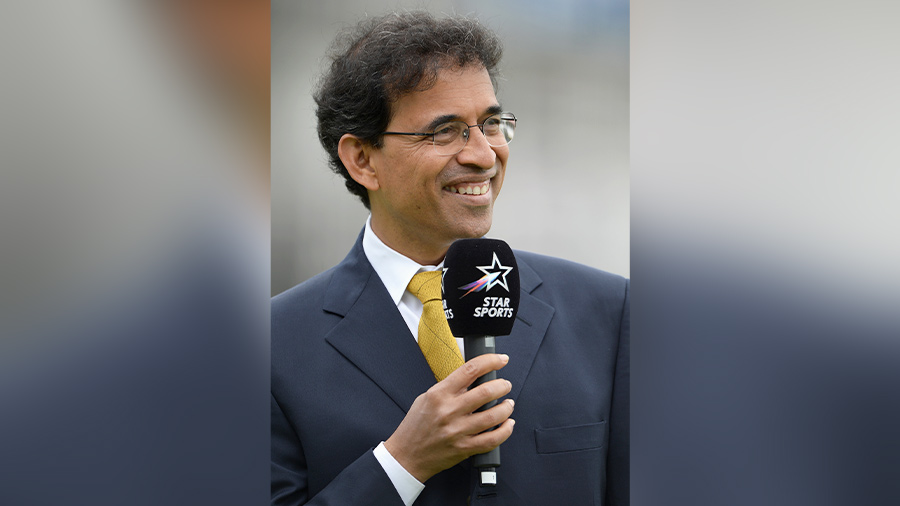
Bhogle may start a YouTube channel or a podcast in the time to come
Getty ImagesBhogle, of course, knows a thing or two about survival himself, about staying relevant across formats. But does he have a timeline in mind, regarding when and how he might want to drop the mic? “I don’t. I’ve never planned my career. Whereas a lot of my batchmates from management school always had a very clear plan, my goal has been to make the most of my situation and be happy. I’m enjoying doing different media right now. Maybe I’ll start a podcast or a YouTube channel [at some point]. But the day I decide it’s over, it’s going to be an easy decision,” responds Bhogle.
In terms of his legacy, Bhogle is clear on how he wants to be remembered: “I’d like to be remembered for bringing a certain dignity to cricket broadcasts. For never desiring ill of anybody. For doing what I was taught to do, which is that when you enter people’s houses [as a broadcaster], you behave like you would if you were invited to their houses for a meal… I don’t like screaming, ranting, shouting or provocative television. If that becomes the way ahead, it’ll be a very easy decision for me to quit.”
Whenever that day arrives and Bhogle stops calling cricket, the world will not only lose the ‘voice of cricket’ but also the voice of a people’s commentator, an enduring embodiment of curiosity, comfort and care. The voice of a man who has ensured that, for all his qualities, he never lets the storyteller become the story.


